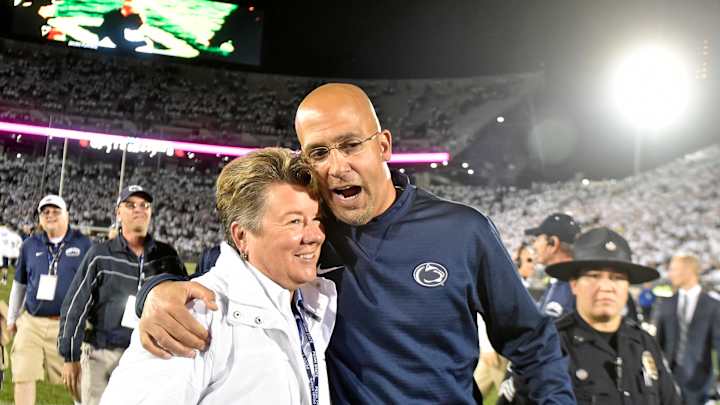Penn State Expects 'Immense' Financial Impact from Football Season's Postponement

Penn State faces a potential revenue loss of $100 million without a 2020 football season, athletic director Sandy Barbour said, yet will be more fortunate than other programs. Barbour said she envisioned a football shutdown leading to a new period of austerity in college sports.
With the Big Ten canceling the 2020 football season, Penn State faces an eight- or nine-figure revenue loss, Barbour said in an email to season-ticket holders last week. She said the financial challenges would be "immense" for Penn State but potentially destructive for smaller athletic departments.
"There are a lot of programs that don’t have the resources that the Power 5 [programs] do that are going to take a long, long time to come back from this," Barbour said in a conference call with reporters.
Penn State already has instituted pay cuts in the athletic department, and Barbour said she took a 15-percent reduction in salary. The athletic department also has generated cost reductions through significantly reduced travel, cutting budgets and delaying planned projects. Barbour has said several times that Penn State has no plans to cut any of its 31 varsity sports programs.
However, football drives Penn State's athletic budget, which reached $160 million in expenses for fiscal year 2018-19, the most recent year for which figures are available. The football program generated $100.5 million of the department's $164.5 million in total operating revenue.
Nearly $39 million of that football revenue came from ticket sales, with another $10.8 million derived from football contributions. Barbour asked for continuing financial support in her letter to season-ticket holders.
"We cannot let this pandemic stall or wipe out all of the incredible work and progress that, with your help, our students and our programs have been able to achieve in the classroom, in our community and, of course, in our competitive venues," Barbour said. "On March 12, 2020, when the NCAA Winter Championships were canceled and our spring sports were halted, your Nittany Lions were in position to complete one of the best years in our history. All this with record-setting academics as the backdrop. We need to be in position to come out of the pandemic with a running start, and we need your support to do that."
Among the options season-ticket holders have for 2020 is to convert their purchase to a tax-deductible donation or to roll over their tickets into 2021. In both cases, season-ticket holders who are paid in full are guaranteed a price freeze for 2021.
Fans also are eligible for a refund of their season tickets. However, in all three options, the seat contributions for 2020 will be converted to a tax-deductible donation to the athletic department's scholarship fund."
"There are probably no good answers, and we had some difficult decisions to make sure that, in this difficult time, our fans had choices to pick from that fit their particular circumstances, understanding that everyone is different," Barbour said of the refund-policy decision. "But we know that there are going to be disagreements about how we laid this out."
Penn State ended the 2018-19 fiscal year with a $12.3 million department reserve, which Barbour has said would help alleviate some budget issues this year. But the future just became much more uncertain.
In 2017 Penn State released an athletics master plan that sought to overhaul many of the university sports facilities over the next 20 years. The master plan carried a large scope and included a new, purpose-built "Center of Excellence" that would serve as a centerpiece of the athletic campus.
Penn State has yet not addressed any changes to its master plan. But Barbour did say that many universities will take a "re-look" at their spending.
"Even among the Power 5 schools there are schools positioned differently that will impact their ability to recover quickly, or recover at all, from this," Barbour said. "So I absolutely think there will be a re-look at college athletics and what we spend on and, frankly what we don't spend on. And how we can maybe pull some things back more to the academy level as they relate to the campuses where our student-athletes are in classrooms every day."

Mark Wogenrich is the editor and publisher of Penn State on SI, the site for Nittany Lions sports on the Sports Illustrated network. He has covered Penn State sports for more than two decades across three coaching staffs, three Rose Bowls and one College Football Playoff appearance.